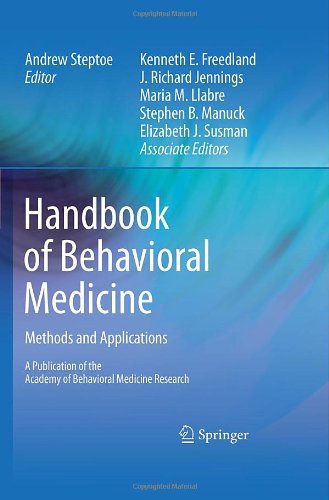Handbook of Behavioral Medicine Methods and Applications Andrew Steptoe, Editor
From assessment technologies to clinical trials, and from the biobehavioral to the psychosocial, behavioral medicine continues to diversify. This sophisticated understanding of health and illness, and its real-world applications, is taking on an increasingly global significance resulting in great advances on the diagnostic, prevention, and intervention fronts. At the same time, new public health concerns (e.g., obesity, stress) are driving the field in promising new directions. The Handbook of Behavioral Medicine surveys established and emerging investigative areas, plus their clinical and research applications, across the range of the discipline. Written by esteemed fellows of the Academy of Behavioral Medicine Research, this comprehensive resource is designed for long-term practicality, reflecting the current evolution toward integrative, multidisciplinary medicine. Focusing on methodologies and applications across medical conditions rather than discrete symptoms and syndromes, the Handbook offers authoritative, innovative coverage in these core areas:
Genetic processes.
Behavioral processes and measures.
Psychological processes and measures.
Social and interpersonal processes.
Biological measures and biomarkers.
Behavioral and psychosocial interventions.
Plus epidemiological perspectives, life course approaches, cutting-edge statistical methods, and the latest advances in neuroscience and neuroimaging.
This wide-ranging scope will benefit a broad cross-section of professional readers, including behavioral medicine researchers in health psychology, psychiatry, clinical medicine, nursing, human physiology and immunology, epidemiology, and public health; and practitioners in behavioral medicine and health education. In addition, the Handbook of Behavioral Medicine is essential reading for graduate and doctoral students in behavioral medicine and health psychology.






Reviews
There are no reviews yet.